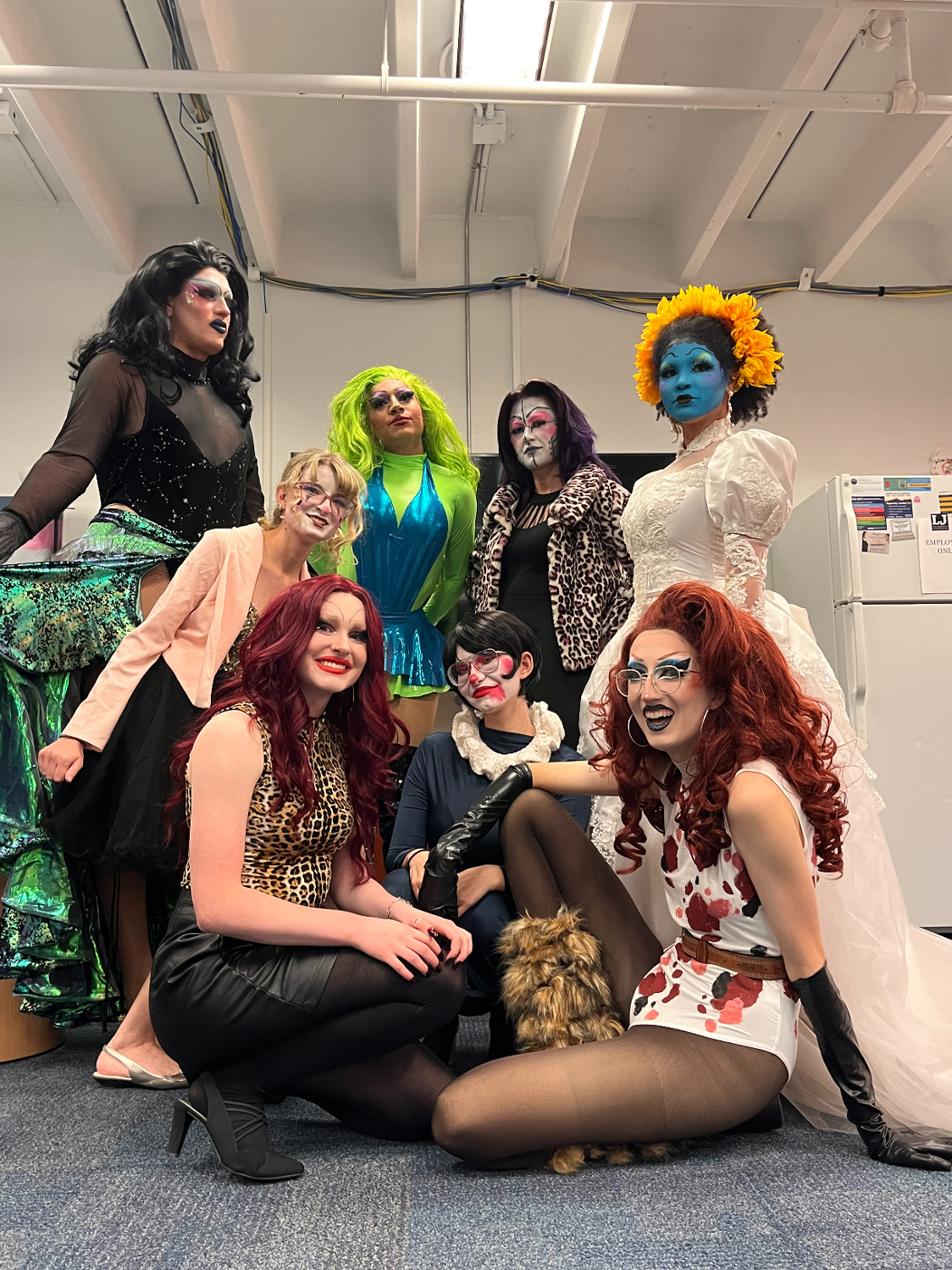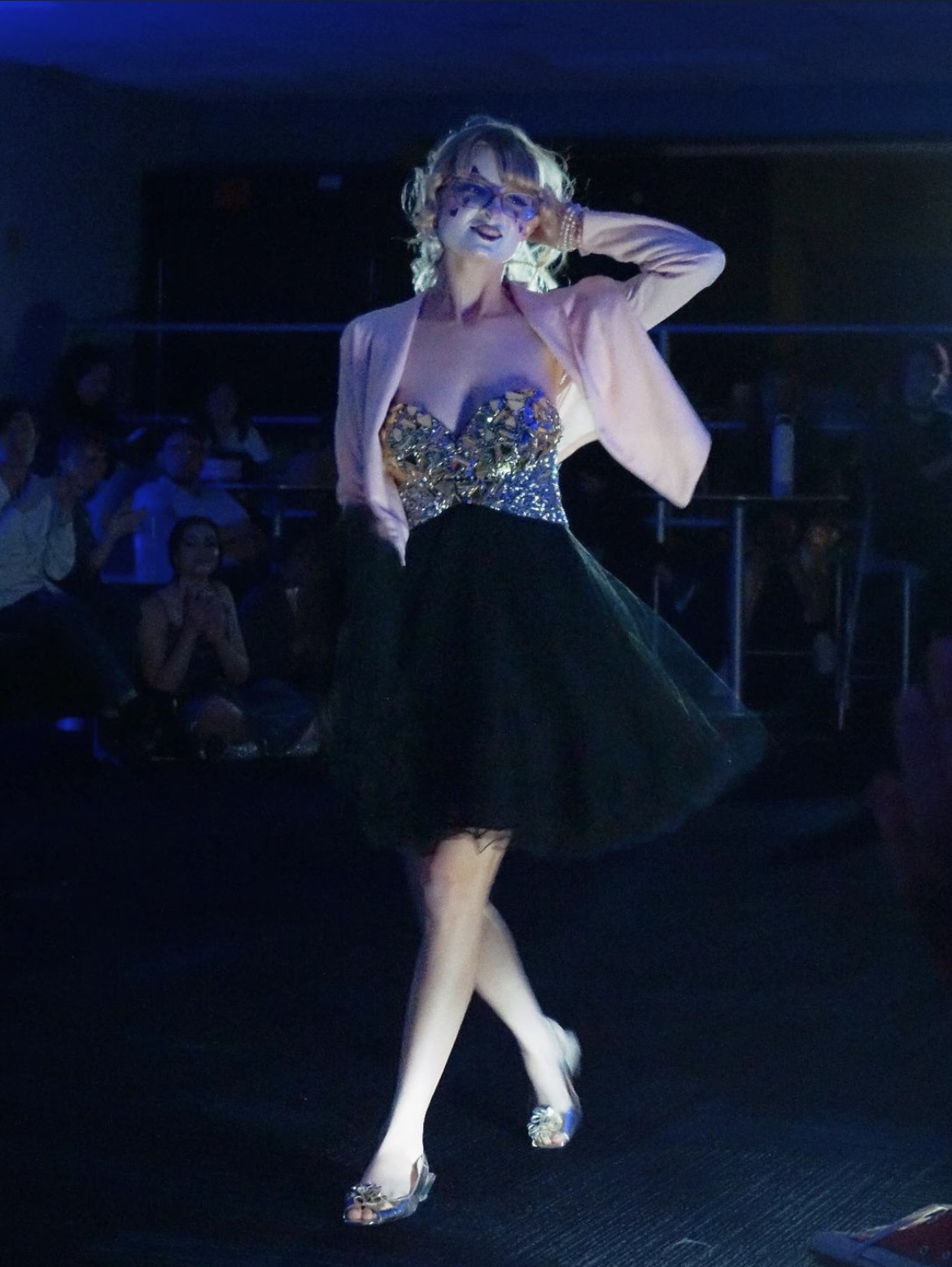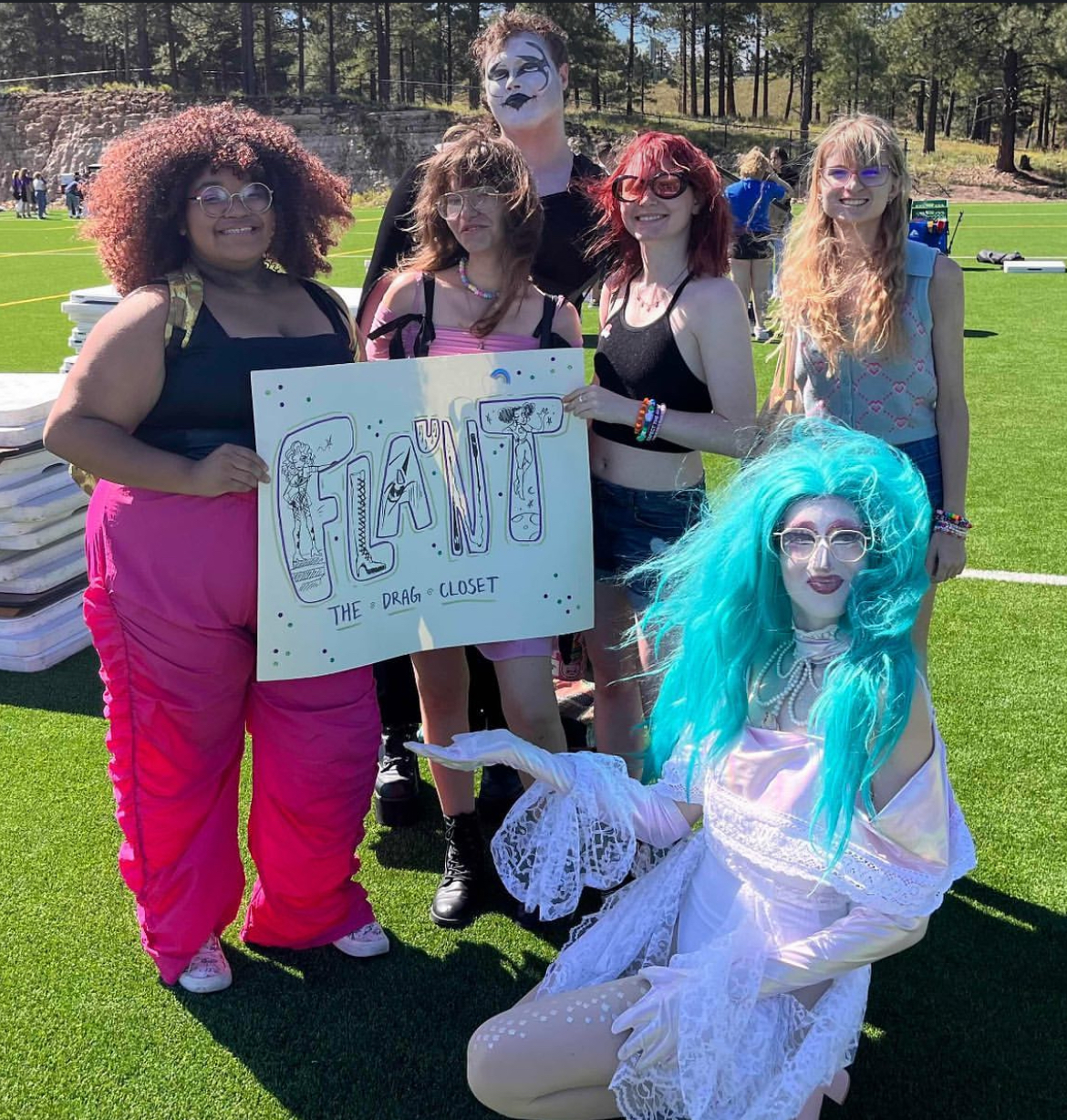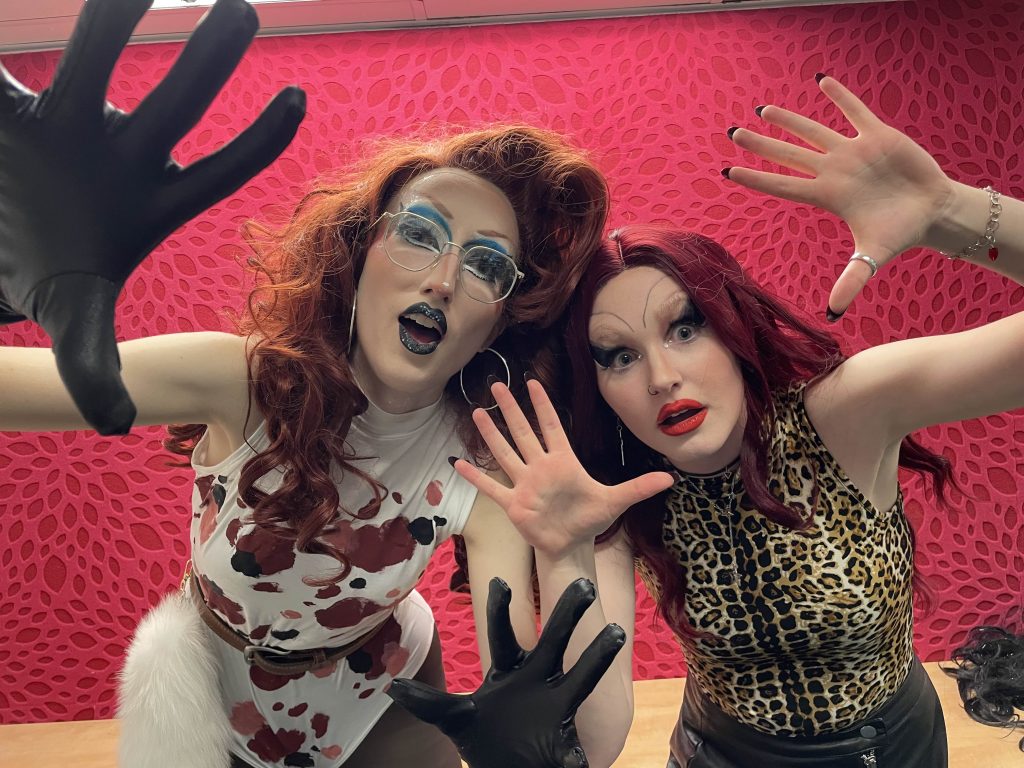What to know:
- Who can participate: Anyone interested in drag performance or learning about drag movements
- Meeting days: Every Thursday (Next meeting is Oct. 17 and covers a deep dive into drag history)
- Meeting time: 7-9 p.m.
- Meeting location: IMQ
About the club:
As NAU’s one and only drag club, FLAUNT aims to bolster the next generation of drag artists with weekly hands-on workshops, show-stopping performance opportunities and indispensable explorations of queer history.
Q&A
FLAUNT president Corbin Malinka, a senior studying art education, began his drag career by teaching himself the basics in his room. Now, he uses his experience wowing crowds and making statements as Gwendolin Cometh to help incoming drag queens thrive. Read on to learn more about FLAUNT’s upcoming performances, Malinka’s favorite FLAUNT memories and how drag plays a valuable role in community movements.

Our goal is to create a safe space for queer people to learn drag and to feel safe expressing themselves. We also want to entertain people through our drag and to show other people that it doesn’t matter who you are, where you come from or what you’ve experienced. You, too, can do drag.
Even if you’re not queer, it’s a safe space to come and learn about drag and do drag if you so please. Sometimes, people have experiences where they think, “I can’t do this.” Maybe people think drag is for cis men. Maybe people think if you’re disabled, you can’t perform.
FLAUNT is here to prove that this is never true. We have disabled performers. We have cisgender women performers. We have transgender performers. We have performers of every background and every experience who come to FLAUNT and do well.
I’ve had people come up to me and say, “I have never seen drag before, but I love it now, and I will come back.” When people see drag, that beauty, that glamour, they think, “I can do that, too,” or even, “If they can do that, I can do this other thing that I was scared of doing.”
A big part of drag is being a community leader, so getting to see your community leaders be bold and be brave is important anywhere. It doesn’t matter if you’re in a big city or a smaller town like Flagstaff. Getting to see people be their bold, beautiful selves inspires others to be their bold, beautiful selves.
What activities does FLAUNT do throughout the year?
We have weekly meetings where we mainly prioritize workshops. We’ve done wig workshops where we teach people how to style big drag hair because, usually, you see drag queens with big, extravagant hair or ponytails. We’ve done sewing workshops, drag makeup workshops and performance workshops.
We also teach about history. In a few weeks, we’ll be going over the broad horizons of queer history like ballroom, the AIDS epidemic and, specifically, Flagstaff drag history. We essentially want to encompass what makes drag important today, what made it important back then and why drag is transcendent.
We also have performances, which we hold auditions for. This year, we did a one-day audition, and next year, we’re going to do two days. We’ll have a live portion of the audition where you’ll get up in front of your peers and explain what you’re going to do while music is playing, or you can physically dance it out. That shows us your experience level and what we can help you work on.
There is also an interview portion of the audition where you tell us why you’re passionate about a certain show theme, why you want to perform and what would make you a good fit for the role. You can also show us pictures of you in drag in the past. That’s essentially what auditions are, and we release audition details in advance.
Tell me a bit about this year’s Orpheum Theater performance!
I’m so excited to talk about Orpheum. It’s Oct. 25, opening the Hallow-weekend. Doors will open at 8 p.m., and shows are at 9 p.m. It’s kind of our FLAUNT tradition where we always have an October show and we always have an April show.
Orpheum is our big moneymaker. It fundraises our club so we can provide things like wigs for wig workshops or if people need makeup and they can’t afford it, we can offer them that extra little bit of help from the club.
It’s also just going to be super fun. There’s going to be costume contests and lots of fun games. Our theme is “Haunted Hollywood,” so it encompasses horror icons and that old Hollywood glamour. I’m kind of infusing both themes and going to be Elvira for the night.
It’s a really important show, especially because I feel like it gives a lot of people their moment in the spotlight and makes them really feel like their voice matters. They really get to shine in front of that big audience who is there specifically for them.

We have our newcomer show coming up on Nov. 16 to showcase the people in our club who started drag coming into the club this year. We’re really saying, “Look what our club can do.” People can come in not knowing anything and then, after coming to the workshops and learning about it, they get to become successful drag artists.
We’re also teaming up with SUN Entertainment for the RainBoo! Halloween dance party on Nov. 1, which I’m really excited about.
Why, in your opinion, is it crucial that those getting involved with FLAUNT learn about queer history and those who came before them?
First and foremost, it’s so you can be grateful. I think it shows a lot about you as a person if you know your history because you’re not taking for granted everything you get to do as a queer person because of people who fought before you. There were people dying in drag before you, and now you have the opportunity to live in drag because of them.
It’s also respectful. It’s important that you have that knowledge so you can have conversations with people about why your existence is important and who died for you to live.
You also aren’t going to be a successful drag artist unless you know about your history. You can 100% tell the difference between a drag artist who is studied and a drag artist who isn’t in their performance, in the way they hold themselves, in the way they talk, in the way they communicate. An uneducated drag artist is never going to be as good or as successful in what they do as an educated drag artist. We want to set people up for success, and that’s why learning your history is so important.
How and why did you get involved with FLAUNT?
This is my second year involved with FLAUNT, but technically I’ve been working with them since I was president of Art Club, previously. I worked with them maybe a year and a half ago, so I have known of FLAUNT’s existence and have been doing things with them for two years now.
I decided to officially get involved because I fell in love with drag over the summer. There’s this thing known as a “bedroom queen” where you sit at home by yourself and teach yourself drag, and I was craving that community. FLAUNT was absolutely that natural community, and I had developed a friendship with the previous president, Jayde Justyce.
Through our friendship and our shared passion for drag, I decided that this was the club for me, and I was very excited about it.

Absolutely. I think we can get a reputation sometimes for being extremists or crazy, over-the-top, unapproachable, scary drag artists. But we’re not. We’re just people. At night, I vacuum floors and clean toilets for a living, and sometimes, during the day, I get to dress up as a pretty woman.
That’s really the long and short of it. Yes, I fight for things. I’m always going to fight for things. What a lot of people don’t understand about drag is that it is a protest. Every time you get in drag, you are protesting. Being a part of that fight, being a part of that protest, is important to me as a drag artist.
I will use my voice and speak up when things are wrong. Does that make me an extremist? No. It makes me someone who is willing to put their foot down when necessary.
Do you have a favorite FLAUNT memory?
I have a lot of good memories with FLAUNT. I think, right now, my favorite memory of FLAUNT is right after our “Back to School” show. I was looking around me at these queer artists who just put something together, and they were nervous and stressed because it was our first time with a new board in a new environment.
I remember looking around me, and everyone was smiling. Everyone felt good about what they did. We made a toast, and everyone just said, “Thank you.” The gratefulness at that moment, just seeing these happy queer people who got to put on a show and share their voices, was probably my favorite memory.
What advice do you have for someone looking to join FLAUNT?
Just show up. You never know until you show up. We have people come and go and, as much as I want people to stay, sometimes it’s just not for you. But you never know it’s for you unless you show up and you do it.
If you have that urge, that little thing inside of you that says, “I really want to try drag, but I don’t know. I’m broke,” that’s why we’re here. We’re here to support you, to uplift you and to make it so you feel like a star. That’s the goal of our club is to make every queer person who wants to feel that “I did it” moment feel it.
We have the materials. Come and try.
Find out more about FLAUNT’s upcoming performances and events by following @flauntatnau on Instagram.



